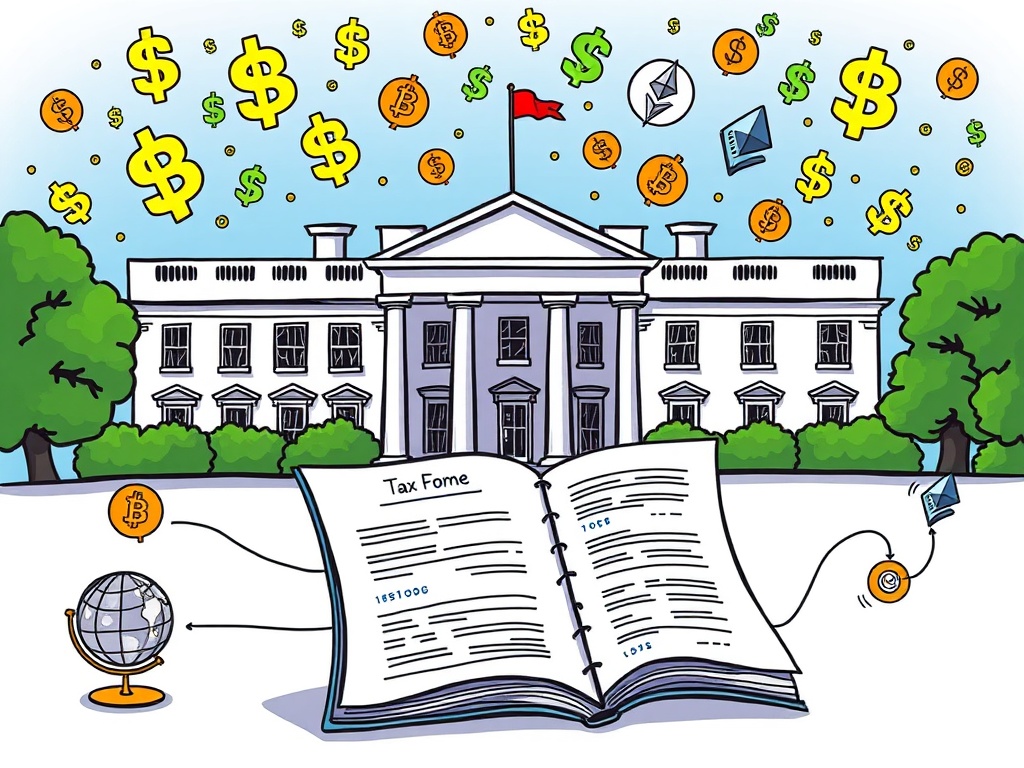BitcoinWorld

Crypto Tax Reporting: Urgent New Rules for Foreign Accounts Unveiled
The world of cryptocurrency is constantly evolving, and with its rapid growth comes increasing scrutiny from regulators worldwide. For U.S. taxpayers and crypto enthusiasts alike, a significant development is on the horizon: a new proposal from the White House regarding crypto tax reporting for foreign accounts. This isn’t just a minor tweak; it’s a strategic move aimed at curbing offshore tax evasion and reshaping how digital assets are monitored on a global scale. If you’re involved in crypto, understanding these potential changes is absolutely crucial for compliance and peace of mind.
Why the Push for Enhanced Crypto Tax Reporting?
Governments have long grappled with the challenge of offshore tax evasion, and the rise of cryptocurrencies has introduced a new dimension to this complex issue. Digital assets, by their very nature, can be transferred across borders with relative ease and often with a degree of anonymity that traditional financial systems don’t offer. This perceived opacity has led many tax authorities to believe that crypto could be exploited to hide wealth and avoid tax obligations.
The proposal, stemming from a report initiated during the Trump administration, directly addresses this concern. Its core aim is to bring foreign crypto accounts under the same reporting umbrella as traditional foreign bank accounts, which U.S. taxpayers are already required to disclose under the Foreign Bank and Financial Accounts (FBAR) regulations. The underlying motivation is clear: to ensure that all taxable income, regardless of its form or location, is properly reported to the IRS. This move reflects a broader global trend towards greater transparency in the digital asset space, as governments worldwide seek to establish clear regulatory frameworks for cryptocurrencies.
Unpacking the Proposal: Who’s Affected by New Foreign Crypto Account Rules?
So, what exactly does this proposal entail, and who might feel its direct impact? At its heart, the recommendation suggests that U.S. taxpayers holding significant balances in foreign cryptocurrency accounts would need to report these holdings to the Treasury Department. This is a crucial distinction from simply reporting crypto transactions on your annual tax return; it’s about declaring the existence and value of the accounts themselves.
Key Aspects of the Proposal:
- Mandatory Disclosure: U.S. taxpayers would be required to report foreign crypto accounts exceeding a certain threshold (similar to FBAR rules, which typically apply to accounts with an aggregate value over $10,000).
- Combating Evasion: The primary goal is to close potential loopholes that allow individuals to shield digital assets from taxation by holding them in overseas platforms or wallets.
- Exclusion of DeFi: Interestingly, the proposal specifically excludes decentralized finance (DeFi) transactions from these new reporting requirements. This highlights the regulatory challenge posed by DeFi’s unique, often permissionless and non-custodial nature, and suggests regulators are still navigating how best to approach this burgeoning sector.
- Support for U.S.-Based Exchanges: A significant part of the proposal aims to support domestic crypto exchanges. By making it harder to evade taxes via foreign platforms, the White House hopes to encourage U.S. taxpayers to use regulated, U.S.-based exchanges, which already have existing reporting mechanisms in place (like Form 1099-B). This could level the playing field and bolster the competitive position of American crypto businesses.
For individuals with foreign crypto account holdings, this means a potential increase in compliance burden. It underscores the importance of meticulously tracking all digital asset activities, regardless of where the assets are held. While the exact thresholds and implementation details are still subject to further development, the direction is clear: greater transparency is coming.
Beyond Reporting: How Will Regulatory Shifts Impact Digital Assets and Crypto Banks?
The White House’s proposal isn’t just about foreign account reporting; it’s part of a broader push to modernize financial regulations to accommodate the rapidly evolving digital asset landscape. The report also touches upon two other critical areas that will significantly impact the future of crypto:
1. Faster Regulatory Approval for Crypto Banks:
The traditional banking system has been slow to adapt to cryptocurrencies, partly due to regulatory uncertainties and the lengthy approval processes for new financial institutions. The proposal urges for expedited regulatory approval for crypto banks. This could mean:
- Increased Legitimacy: Bringing crypto businesses into the regulated banking fold could enhance their credibility and stability.
- Improved Services: Faster approvals could lead to more robust and secure financial services tailored for digital assets, including clearer pathways for fiat on/off-ramps, lending, and institutional participation.
- Reduced Friction: A more streamlined process could reduce the operational hurdles faced by legitimate crypto entities seeking to offer regulated services.
2. Updates to the Bank Secrecy Act (BSA) to Address Crypto-Related Risks:
The Bank Secrecy Act (BSA) is a cornerstone of anti-money laundering (AML) and counter-terrorist financing (CTF) efforts in the U.S. It requires financial institutions to assist U.S. government agencies in detecting and preventing money laundering. The current BSA was designed for traditional finance, and its application to crypto has often been a point of contention and confusion.
Updating the BSA for digital assets is crucial for:
- Clarity and Compliance: Providing clear guidelines for crypto businesses on their AML/CTF obligations.
- Risk Mitigation: Enhancing the ability of regulators and law enforcement to identify and mitigate illicit financial activities involving cryptocurrencies.
- Global Standards: Aligning U.S. regulations with international standards set by bodies like the Financial Action Task Force (FATF), which has already issued guidance on virtual assets.
These proposed updates signal a commitment to integrating digital assets more fully into the existing financial regulatory framework, rather than treating them as an entirely separate or unregulated domain. This could lead to a more mature and secure ecosystem for cryptocurrencies in the long run.
Navigating the Future: Actionable Insights for US Taxpayers
With these significant regulatory shifts on the horizon, what should U.S. taxpayers and crypto investors do to prepare? Proactive steps are key to ensuring compliance and avoiding potential pitfalls.
Key Actionable Insights:
- Stay Informed: Regulations are dynamic. Continuously monitor official announcements from the Treasury, IRS, and other relevant bodies. Subscribe to reputable crypto news sources that focus on regulatory developments.
- Maintain Meticulous Records: This cannot be stressed enough. Keep detailed records of all your cryptocurrency transactions, including:
- Dates and times of transactions.
- Types of cryptocurrency involved.
- Quantities bought, sold, or exchanged.
- Fair market value in USD at the time of transaction.
- Wallet addresses or exchange names used.
- Records of foreign accounts, including account numbers and balances.
- Understand Foreign Account Reporting: If you hold crypto on non-U.S. exchanges or in foreign-based self-custody solutions, familiarize yourself with FBAR requirements and consult a tax professional to determine if your holdings meet the reporting thresholds.
- Consider Professional Advice: Crypto tax laws are complex and constantly evolving. Engaging with a qualified tax advisor specializing in digital assets can save you significant headaches and ensure accurate reporting. They can help you navigate capital gains, income from staking or mining, and now, foreign account disclosures.
- Utilize Tax Software: There are many crypto-specific tax software solutions available that can help automate the tracking and calculation of your crypto tax obligations. These tools can integrate with various exchanges and wallets, simplifying the process.
While these proposals may seem daunting, they also represent a step towards greater clarity and legitimacy for the crypto industry. By addressing concerns like tax evasion and money laundering, regulators aim to build a more secure and trusted environment for US taxpayers to engage with digital assets.
Conclusion: A New Era of Transparency for Crypto
The White House’s proposal for enhanced crypto tax reporting for foreign accounts marks a pivotal moment in the regulatory journey of digital assets. It underscores a clear intent from U.S. authorities to integrate cryptocurrencies more fully into existing financial oversight frameworks, ensuring transparency and combating illicit activities. While the exclusion of DeFi transactions from this specific reporting requirement highlights the unique challenges of regulating decentralized protocols, the broader push for faster crypto bank approvals and BSA updates signals a comprehensive approach to modernizing financial laws for the digital age.
For individuals and institutions alike, the message is unequivocal: proactive compliance and diligent record-keeping are no longer optional but essential. As these proposals move closer to becoming law, they will undoubtedly shape the future landscape of cryptocurrency, fostering an environment that prioritizes accountability while aiming to support legitimate innovation within the U.S. financial system. This new era promises greater clarity, but also demands heightened vigilance from all participants in the crypto economy.
Frequently Asked Questions (FAQs)
Q1: Who is affected by the new crypto tax reporting proposal for foreign accounts?
A1: The proposal primarily affects U.S. taxpayers who hold cryptocurrency in foreign accounts or on non-U.S. exchanges. If the aggregate value of these foreign digital asset accounts exceeds a certain threshold (typically $10,000, similar to existing FBAR rules), reporting would likely be required.
Q2: Why are DeFi transactions excluded from this particular proposal?
A2: Decentralized finance (DeFi) transactions are often peer-to-peer and occur on permissionless protocols without traditional intermediaries. This makes them inherently difficult to track and report in the same manner as accounts held on centralized exchanges. The exclusion suggests regulators are still developing a separate, more tailored approach to DeFi regulation.
Q3: What is the Bank Secrecy Act (BSA) and how will it be updated for crypto?
A3: The Bank Secrecy Act is a U.S. law requiring financial institutions to assist government agencies in detecting and preventing money laundering. Updates for crypto would aim to provide clearer guidelines for crypto businesses on their Anti-Money Laundering (AML) and Counter-Terrorist Financing (CTF) obligations, ensuring digital asset transactions can be monitored for illicit activity.
Q4: How can I ensure compliance if I have foreign crypto accounts?
A4: The best way to ensure compliance is to maintain meticulous records of all your foreign crypto holdings and transactions, including their fair market value. It is highly recommended to consult with a qualified tax professional who specializes in cryptocurrency to understand your specific reporting obligations and to navigate the complexities of international tax laws.
Q5: Will this proposal stifle crypto innovation in the US?
A5: While some in the crypto community might view increased regulation as a potential hurdle, the proposal aims to create a more legitimate and stable environment for digital assets. By addressing concerns like tax evasion and money laundering, it could foster greater institutional adoption and public trust, potentially leading to more sustainable innovation within a regulated framework.
If you found this breakdown of the White House’s crypto tax reporting proposal insightful, don’t keep it to yourself! Share this article with your network on social media to help others understand these critical regulatory developments. Your shares help us continue providing valuable insights into the evolving world of digital assets.
To learn more about the latest crypto tax reporting trends, explore our article on key developments shaping digital asset compliance.
This post Crypto Tax Reporting: Urgent New Rules for Foreign Accounts Unveiled first appeared on BitcoinWorld and is written by Editorial Team




